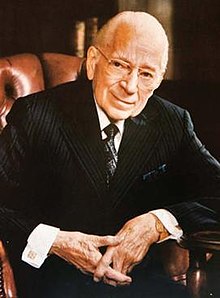Herbert W Armstrong
| Herbert W. Armstrong | |
|---|---|
 Armstrong in the mid-'70s
| |
| Born |
July 31, 1892 Des Moines, Iowa, U.S. |
| Died |
January 16, 1986 (aged 93) Pasadena, California, U.S. |
| Cause of death | Heart conditions, Anemia |
| Resting place | Altadena, California |
| Residence | Pasadena, CA, Tucson, AZ |
| Nationality | American |
| Education | Attended North High School in Des Moines |
| Occupation |
Evangelist author |
| Known for |
Radio evangelism founding the Worldwide Church of God |
| Title | Pastor General of the Worldwide Church of God (1946-1986) |
| Successor | Joseph W. Tkach |
| Spouse(s) |
Loma Dillon (m. 1917–1967) (her death) Ramona Martin (1977-1984, divorced) |
| Children | 4 with Loma (Beverly, Dorothy, Richard David, Garner Ted) |
| Parent(s) |
Horace Elon Armstrong Eva Wright Armstrong |
| Relatives | Dwight L. Armstrong (1904-1984), brother |
Herbert W. Armstrong (July 31, 1892 – January 16, 1986) founded the Radio Church of God which was incorporated October 21, 1933 and was renamed Worldwide Church of God on June 1, 1968, as well as starting Ambassador College (later Ambassador University) October 8, 1947. He was an early pioneer of radio and tele-evangelism, first taking to the airwaves on January 7, 1934 from the 100-watt station KORE Eugene, Oregon. Armstrong preached what he claimed was the comprehensive combination of doctrines in the entire Bible, in the light of the New Covenant scriptures, which he maintained came directly from the Bible. These theological doctrines and teachings have been referred to as Armstrongism by non-adherents. His teachings included the interpretation of biblical prophecy in light of British Israelism, and required observance of parts of the Mosaic Law including seventh-day Sabbath, dietary prohibitions, and the covenant law "Holy Days".
Armstrong proclaimed that behind contemporary world events loomed various Biblical prophecies. In late 1951, Dr. Herman Hoeh (a then recent graduate of Ambassador College) said, with conviction, that Mr. Armstrong was "an apostle", one sent forth with the same commission as the early disciples were given, to preach the good news message. Armstrong often said that, like John the Baptist (Elijah), he was a voice preaching in a spiritual wilderness of religious confusion. For this reason he was considered to be both an "Apostle" and end-time "Elijah" proclaiming as God's representative the Gospel of God's Kingdom to the World before the return of Jesus Christ. He also founded the Ambassador International Cultural Foundation, which promoted the arts, humanities, and humanitarian projects. Through his role with the foundation, Armstrong and his advisers met with heads of governments in various nations, for which he described himself as an "ambassador without portfolio for world peace."
...
Wikipedia
